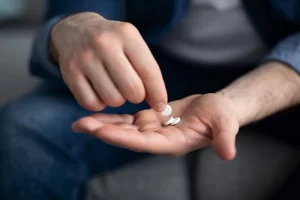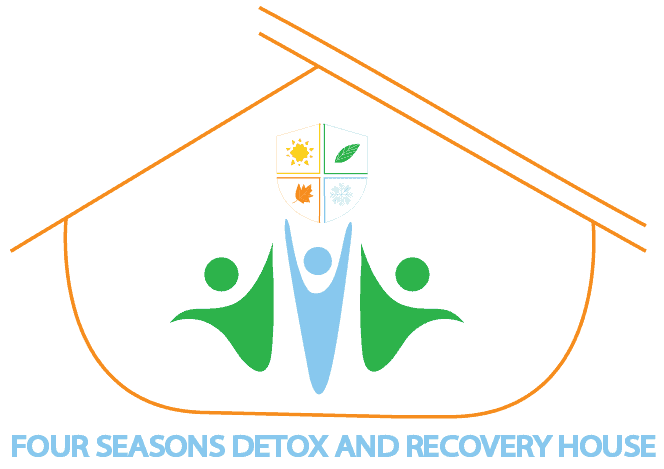Alcohol addiction can creep in suddenly. What starts as having drinks casually or socially on the weekends can quickly turn into alcohol abuse and alcohol addiction.
While alcohol is entirely legal above a certain age, it is also frequently misused and abused in American society. The Substance Abuse and Mental Health Services Administration estimates that around 15 million people in the United States meet the criteria for alcohol use disorder or alcohol addiction.
Seeking inpatient treatment or outpatient treatment for your substance use disorder can be scary. However, Four Seasons Detox works with you to ensure that your inpatient alcohol rehab center needs are met. If you’re exploring inpatient alcohol rehab programs for the first time, here is what you’ll need to know.
Signs It Is Time to Consider Inpatient Alcohol Addiction Treatment
Committing to inpatient treatment can be overwhelming, and many people try to find reasons why their alcohol or drug abuse is not bad enough for treatment. However, if you find yourself agreeing with any of these statements, it may be time to consider inpatient or outpatient treatment.
Common Signs of Addiction:
Drinking Patterns and Symptoms:
You are finding that you have to drink more to get the effects you used to have from drinking.
You begin to experience withdrawal symptoms as soon as your last drink has worn off.
Financial/Property loss:
You have experienced significant financial loss or have had to sell items or personal property in order to fund your alcohol abuse.
Relationships and Friendships:
You have lost romantic relationships, family relationships, or friendships due to your drinking.
You hide the amount you drink from others or choose to socially isolate yourself in order to drink alone.
Mental Health:
You have begun to experience new or worsening mental health symptoms due to your drinking.
You find that you are drinking to avoid treatment for your mental health conditions.
The Alcohol Withdrawal and Detox Process
Initially, before entering a residential treatment program or inpatient rehab program, you will need to complete medically supervised detox. This will allow you to detox the alcohol out of your body while being monitored by a team of medical professionals.
Withdrawal Symptoms
Withdrawal symptoms during alcohol detox will vary depending on a few factors. These can include your age, medical history, mental health history, and prior alcohol or drug addiction history.
As soon as your last drink starts to wear off, you will experience many mild withdrawal symptoms. These symptoms can include shakiness, muscle spasms, sweats, chills, headaches, fatigue, nausea, diarrhea, or vomiting.
As the withdrawal period continues, additional severe alcohol withdrawal symptoms may include hallucinations, seizures, electrolyte imbalances, migraines, fainting, and elevated blood pressure and heart rate.
How Does Medical Detox Help?
Medical detox in inpatient facilities is an important first step in your treatment plan. During supervised detox, you will be kept comfortable by a medical provider and will have any medical interventions necessary to aid in the withdrawal treatment process.
While you can quit alcohol alone, it is always a more comfortable experience to do inpatient detox at a treatment facility.
How Does Inpatient Alcohol Rehab Work?
If you’ve decided it’s time to seek inpatient alcohol rehab or addiction treatment programs, you may be wondering how they are structured. Usually, inpatient treatment involves the patient living on-site at the specific treatment center.
The length of your stay will depend on a few factors:
- Prior substance abuse history
- Whether or not you have attended drug rehab or alcohol rehab centers in the past
- Your medical and mental health history
- Your insurance and payment plan
During your stay in inpatient treatment, you will have access to a variety of different programs and therapies to aid in the recovery process. Some of these may include:
Individual Therapy
During inpatient treatment, individual therapy will allow you to meet one-on-one with a therapist to discuss your alcohol abuse. You will be able to work on identifying triggers, finding coping skills, and relapse prevention. If you are suffering from other conditions, you can also participate in dual diagnosis treatment for co-occurring mental health disorders.
Group Therapy
Group therapy during inpatient rehab will allow you to do similar processing as individual therapy, but in a group setting. Here you can develop support and create relationships with those also in recovery.
Case Management
Case management will be helpful for managing the logistics of your recovery. Here you can receive financial counseling and support, employment assistance, help finding additional treatment centers for after you discharge, and general case support.
Experiential Activities
These activities can help you to find a creative outlet and possible new hobbies for after discharge. Some of these activities may include music therapy, art therapy, nature therapy, meditation therapy, and animal therapy.
Take the Next Step Towards Sobriety with Four Seasons Detox
Finding an inpatient treatment center that fits your needs is vital to receiving sufficient treatment in the recovery process.
If you are ready to make the next step towards an addiction-free life, give us a call today at 805-991-5111. If you are not ready to make the call, you can fill out our contact form to receive a callback from a certified addiction professional.
Concerned About Payment?
The thought of paying for addiction treatment should not stop you from seeking the programs you need. If you are unsure about insurance coverage, you can view our list of covered providers or fill out a request for insurance information.






